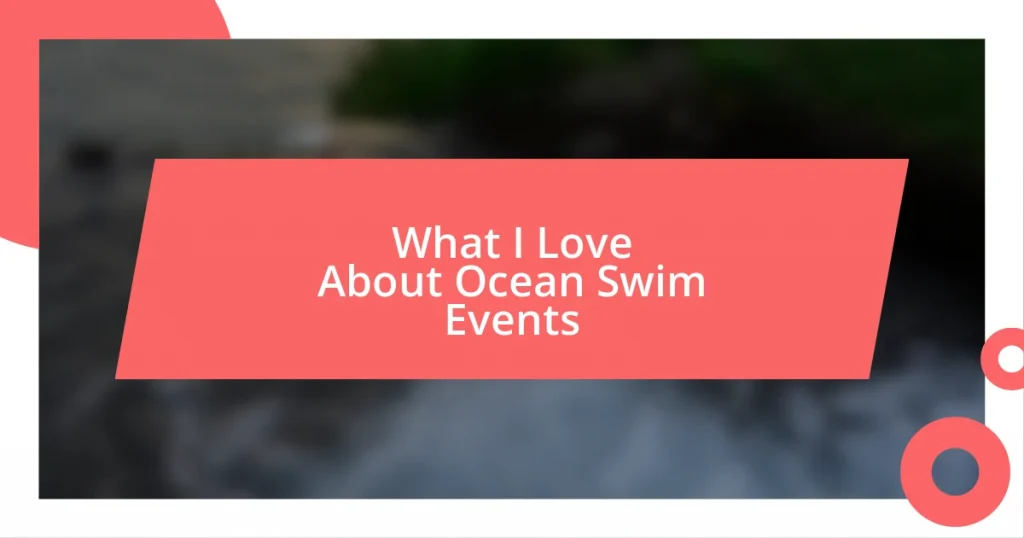Key takeaways:
- Ocean swimming enhances physical fitness and mental well-being while creating a unique connection to nature.
- Training for ocean events requires adaptation to varying conditions, improved technique, and specialized gear for optimal performance.
- Participating in ocean swims fosters a sense of community and emphasizes the importance of safety, buddy systems, and proper preparation.
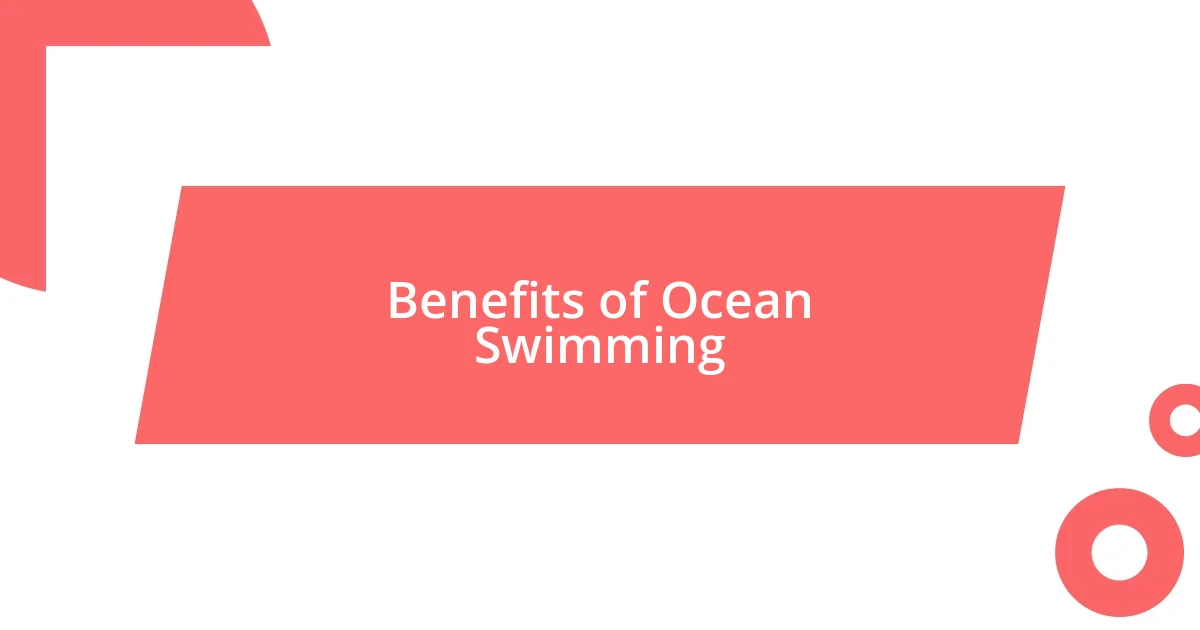
Benefits of Ocean Swimming
One of the most exhilarating aspects of ocean swimming is the immediate connection to nature it offers. I’ll never forget that feeling when I first plunged into the salty waves; the sensation was both invigorating and soothing. Can you relate? There’s something about the ocean’s embrace that has a way of washing away stress and rejuvenating the spirit.
Besides the mental boost, ocean swimming is a fantastic workout. The resistance of saltwater makes every stroke more challenging, leading to improved strength and endurance. I often find myself pushing further and faster in the waves than I do in a pool. Isn’t it incredible how the ocean can become both a gym and a sanctuary at the same time?
Moreover, swimming in the ocean brings a unique sense of freedom. With each wave, I feel lighter, as if the water lifts not just my body but also my worries. Have you ever noticed how the sound of crashing waves seems to tune out the chaos of everyday life? It’s a beautiful reminder that sometimes, the best therapy is right beneath the surface.
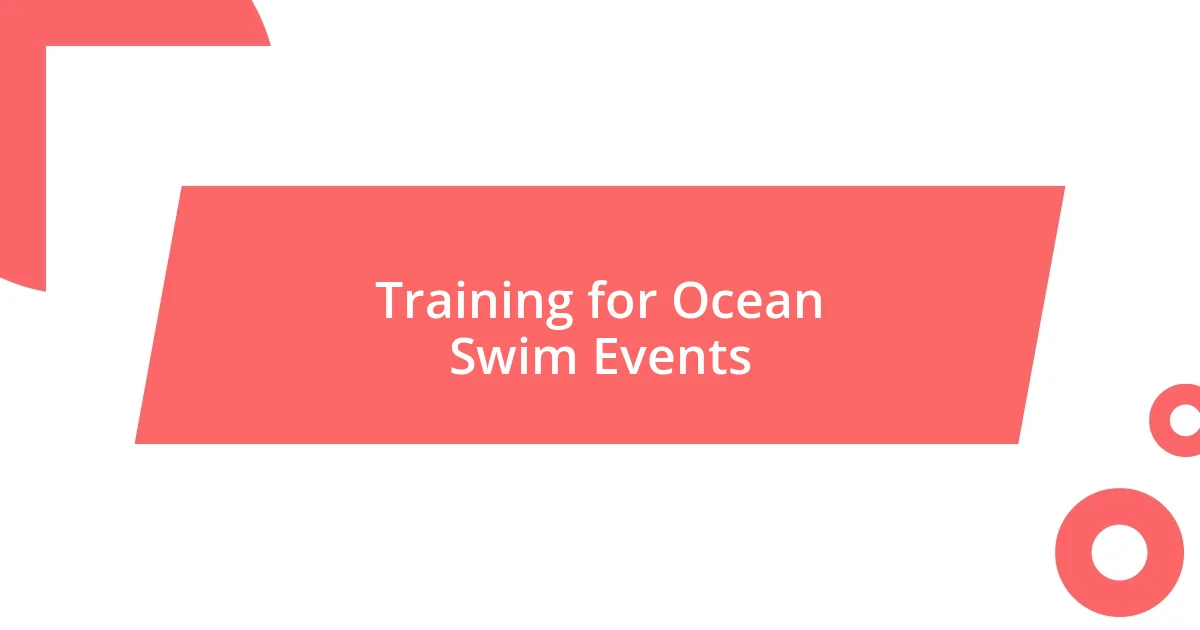
Training for Ocean Swim Events
Training for ocean swim events requires a unique approach compared to pool swimming. I’ve learned that adapting to the ocean’s unpredictable conditions can take some practice. One memorable training session for me was a misty morning when the waves were particularly unruly. I remember feeling both exhilarated and slightly anxious as I navigated the choppy water. That experience showed me the importance of not just building endurance but also developing comfort in diverse ocean conditions.
Here are a few training tips that have helped me prepare effectively:
- Start gradually: Introduce ocean swimming slowly if you’re transitioning from a pool.
- Practice in open water: Regularly swim in the ocean to familiarize yourself with the environment.
- Work on your sighting technique: Learn to lift your head to spot buoys without losing your rhythm.
- Incorporate strength training: Focus on exercises that improve your upper body strength and core stability.
- Get used to the temperatures: Spend time acclimating to colder water to make race day feel more comfortable.
Each of these tips has contributed to my personal growth as an ocean swimmer, making me more confident in my abilities when faced with the waves on race day.
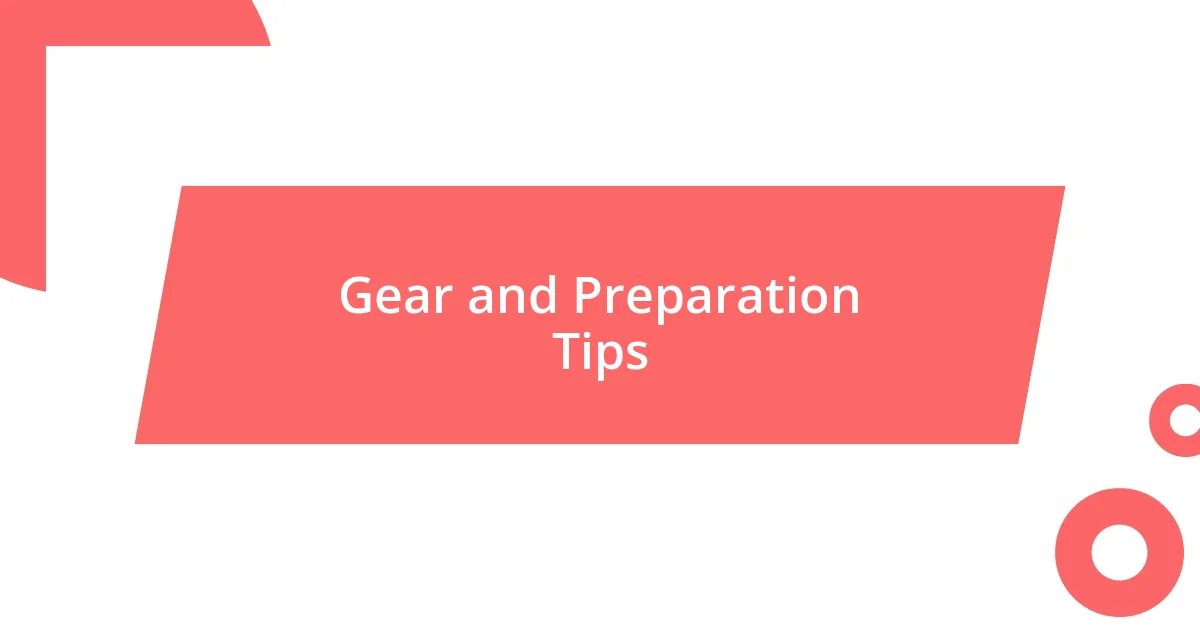
Gear and Preparation Tips
It’s amazing how the right gear can significantly enhance your ocean swim experience. I always recommend investing in a quality wetsuit. On one of my early swims, a friend lent me his high-end suit, and I was blown away by how much warmer and buoyant it made me feel. It truly transforms the swim, allowing for a more enjoyable experience in cooler waters. Aside from a wetsuit, don’t underestimate the importance of good goggles. The right fit can make all the difference; I remember a race when my goggles leaked, and it made the entire event more challenging.
When preparing for an ocean swim, consider your hydration and nutrition strategy as well. On the day of my first event, I neglected to hydrate adequately before diving into the waves. As the race progressed, I felt fatigued, and I learned the hard way that even a short swim can deplete your energy reserves in saltwater. I now prioritize a balanced pre-race meal and hydrate the day before to keep my energy levels steady. Simple adjustments in your routine can lead to a more positive experience and better performance.
Lastly, practice makes perfect, especially when it comes to gear checks. I’ve developed a habit of simulating race day conditions in my training. Before my last ocean swim, I wore my wetsuit and practiced sighting while getting used to my goggles. This way, I ensure that everything fits snugly and works as intended. It’s made a noticeable difference in my comfort during actual swim events. See what works for you, and don’t hesitate to make adjustments as necessary.
| Gear | Tip |
|---|---|
| Wetsuit | Invest in quality for warmth and buoyancy. |
| Goggles | Choose a fit that prevents leaks. |
| Hydration System | Hydrate well the day before the race. |
| Nutrition | Eat a balanced pre-race meal. |
| Practice | Simulate race conditions in training. |

Strategies to Enhance Performance
One strategy that’s really helped me enhance my performance is setting a solid pacing strategy. I remember my first ocean swim; I was so excited that I sprinted out the gate, only to hit a wall halfway through. Now, I like to break the swim into segments, focusing on maintaining a consistent pace. It might seem tedious, but trust me, those mental checkpoints keep me energized and help me avoid burnout. Have you ever noticed how your adrenaline can sabotage a great start?
Practicing specific drills can also boost your skills. For example, I include drills that focus on breathing and body positioning in my weekly training. I once dedicated an entire session to just breathing every three strokes, and that moment clicked for me. It not only improved my technique but also calmed my nerves during competitions. How often do we overlook these small adjustments that can lead to significant improvements?
Lastly, I find that mental visualization goes a long way in building confidence. Before a race, I close my eyes and picture myself gliding through the water, effortlessly navigating the waves. It sounds a bit out there, but this technique has grounded me in tough situations. Have you ever tried visualizing a successful swim? Sometimes, the mind can be just as crucial as the body in enhancing performance.

Community and Connection in Events
There’s something truly special about the sense of community at ocean swim events. I still remember my first race, surrounded by fellow swimmers, all of us buzzing with anticipation and nerves. It felt like joining an extended family for that day, a group of people connected by a shared love for the ocean and the thrill of the challenge. Have you ever felt that electrifying energy at a gathering? It’s a powerful reminder that we’re all in this together, cheering each other on, and that makes the experience so much richer.
More than just a competition, ocean swims foster lasting connections. After one particularly intense race, I struck up a conversation with a fellow participant. We bonded over our struggles in the choppy waters that day. I was surprised to find that we had so much in common beyond swimming. We’ve since trained together and continue to support each other in the sport. Isn’t it amazing how a shared challenge can lead to meaningful friendships?
Events also create a wonderful platform for forging connections with volunteers and organizers who are passionate about coastal health and ocean sports. During one event, I spent some time talking to a volunteer who was not only enthusiastic about the race but also deeply knowledgeable about ocean conservation. That interaction opened my eyes to how intertwined our love for swimming is with our responsibility to protect these beautiful waters. It really got me thinking: How often do we consider the impact of our passion on the world around us?
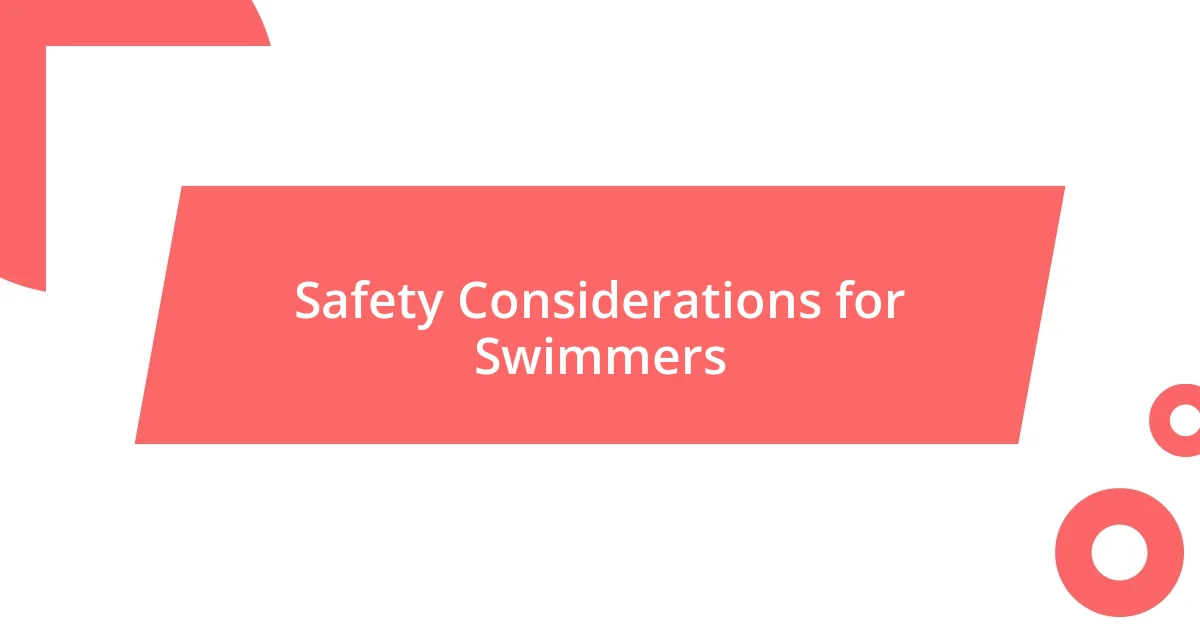
Safety Considerations for Swimmers
Swimmers must always prioritize safety to fully enjoy ocean swim events. I remember during one race, I underestimated the swell and ended up struggling to stay afloat. That experience taught me the importance of assessing weather and water conditions before diving in. Have you ever faced unexpected challenges while swimming? It’s crucial to stay informed and prepared.
Equipping yourself with proper safety gear is non-negotiable. A buoy, for instance, not only increases your visibility to lifeguards and boats but also provides a helpful resting point in case you need to catch your breath. I recall a moment where I was feeling exhausted, and having my buoy nearby gave me the confidence to float and re-focus. Wouldn’t it be wise to think of safety gear as your ally in the open water?
Lastly, never underestimate the impact of swimming with a buddy. I always feel a sense of reassurance when I participate with friends in these events. Just last summer, my training partner spotted me struggling against the current and offered support, which made all the difference. Don’t you agree that having someone by your side not only enhances safety but also adds to the enjoyment of the experience?









